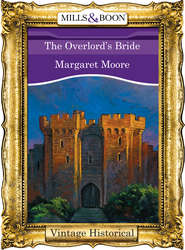По всем вопросам обращайтесь на: info@litportal.ru
(©) 2003-2025.
✖
The Notorious Knight
Настройки чтения
Размер шрифта
Высота строк
Поля
She and her sisters, Adelaide and Elizabeth—Lizette to those who knew her—were wards of the king. That meant John had complete power over them. He could marry them off as suited his purposes, without any regard at all for their happiness. He also gave guardianships of young male heirs to men who would strip the estates bare before the boys came of age. Indeed, he gave no thought at all to the welfare and safety of those for whom he was responsible, including the people of England.
Who could say what he might have done that could affect her, or the people of Averette?
And why had this knight been chosen to deliver her sister’s message? If Adelaide were ill, a servant would have been dispatched.
Was it possible John had selected a husband for Adelaide, or Lizette, or even her—and this man was to be the groom?
Surely not. Please, God, she hoped not. Not for her, and not a man like this, an arrogant fellow who regarded her, and everyone else, with aggravating condescension.
Over the years she’d met many a man just like him. No doubt this Sir Bayard expected her to be impressed with his rank, his bearing, and his good looks. To be sure, he was handsome, despite the thin scar that went from the corner of his right eye to his chin, but she was no flighty, foolish girl to be so easily impressed.
Only once had she met a knight who had been generous, kind, and humble, and who had, surprisingly, been more interested in her than either of her sisters.
But that had been years ago, and James d’Ardenay was dead.
She glanced at Sir Bayard again. What was he seeing as he approached Averette? Tithes and income? Peasants who should be ready to fight in battles and die for their overlord’s cause?
She saw her home and people who labored to keep it prosperous and safe, secure in times of trouble. She saw men and women with names, faces, families, hopes, and dreams—like Young Davy, who knew more about the history of this village and its folk than anyone else. Old Davy was like a grandfather to her, as his wife had been more of a mother to her than her own poor sickly mother had ever been.
She knew the miller and the baker with their constant conflict, Sam at the tavern and Peg, as well as the morose chandler, who barely said three words to anybody.
She saw people like Hale, the hayward, and father of little Teddy, whom Sir Bayard had nearly run down—not that he seemed troubled by that near accident, and of course he’d assumed a sum of money would be appropriate compensation.
There were many others, each one unique, some more likable than others, but all hers to protect, like this household, castle, and estate.
And she would. To the last breath in her body and regardless of who sat on the throne, she would.
AS THEY NEARED the barbican, ten soldiers of the garrison trotted out and blocked the entrance, their spears tipped forward like a spiked wall. The portcullis had been lowered and the inner gate closed. Several archers also lined the walls, which was no more than Bayard would expect.
“Your men are well trained,” he noted in an attempt to achieve some sort of truce when he and the lady came to a halt.
She couldn’t look prouder if she trained them herself. “They are,” she replied. Then she announced, in a loud, clear voice, “All is well!”
He caught the expression that flashed across the soldiers’ faces. That meant something, and it wasn’t that all was truly well.
Likely it meant she saw no immediate danger but they should be prepared to fight.
The portcullis began to rise, and the soldiers wheeled back so that they lined the road. Bayard dutifully fell into step beside Lady Gillian as they passed through the large gatehouse and across the outer bailey, which contained a practice yard, a garden, a smithy, and a round stone dovecote. He’d been right to suggest to Frederic that the portion of the wall visible from the approaching road was no indication of the actual size of the fortress. This one had been built in a tear shape, with the barbican and gatehouse at the narrow end.
They entered the courtyard through thick, bossed oaken gates. He guessed this fortress was built within the last fifty years, although the round keep behind the long hall was clearly older. Judging by the black marks beneath some of the narrow loopholes in the keep, it had been fired more than once. That it was still standing was a silent testament to its builders’ skill, as well as the quality of their mortar.
The main buildings within the inner wall included the hall, the chapel, storerooms, stables, and the kitchen that was attached to the hall by a corridor. The two-story building to the west of the hall was likely the family apartments and perhaps chambers for their guests. Otherwise, he supposed, he and Frederic would be bedding down in the hall with the soldiers and male servants.
There were no piles of barrels, casks, or baskets outside the buildings; no damaged wagons or other items left where they’d broken down until they could be attended to. Indeed, the courtyard was almost painfully neat, and he could only catch the slightest whiff of dung from the stables, which told him they must be cleaned often.
While the tidiness within the fortress might be impressive, he found the silence and the lack of servants—or at least the last of seeing the servants—unsettling. There wasn’t a single person peering out a window or door, although their arrival had hardly been quiet. Either they were the least curious servants he’d ever encountered or this lady governed her castle with an iron hand.
Half the archers on the inner wall now faced inward, their notched arrows pointing at the cobbled space below. More soldiers stood lining the open area, and in the center stood a tall, barrel-chested man dressed in armor, save for his bare head. His expression was grim, his face clean-shaven, the black hair on his head shot through gray, and he faced the gate as if prepared to hold off an attack all by himself.
The garrison commander, Bayard assumed.
“My lady,” the man said with a Scots accent while running a measuring gaze over Bayard.
A Scot. That was interesting. Bayard had developed a great deal of respect for the Scots during the fighting in France when John had tried to regain his lost possessions.
“Sir Bayard de Boisbaston, this is Iain Mac Ken-dren, the garrison commander responsible for my well-trained troops,” Lady Gillian said with the merest hint of a smile.
She must like the Scot, which was also interesting. Many a lady treated the men who protected her as little more than hounds or hawks. “I’m honored.”
The Scot’s response was a dismissive snort—another reaction Bayard de Boisbaston was not accustomed to receiving.
“He brings news from Lady Adelaide,” Lady Gillian announced, while Bayard struggled to control his annoyance.
Armand might have warned him about the garrison commander, too.
Mac Kendren cocked a bushy gray-and-black brow. “Does he, now?”
“I do,” Bayard said, letting his tone convey some of his displeasure at being spoken to so insolently. “Your garrison commander is to be commended for continuing to hold such responsibility in spite of his poor eyesight, my lady.”
“There’s naught wrong with my eyes,” the Scot declared with a slightly puzzled frown.
Bayard cocked a brow. “I thought there must be when I saw rust on the bottom of your hauberk.”
The Scot glanced down, as did the lady. Bayard permitted himself a little smile of satisfaction when the Scot’s face turned scarlet, for there was indeed three spots of rust at the bottom of his hauberk.
More amusement and challenge came of Bayard’s dark eyes. “I also note, my lady, that we haven’t yet exchanged the kiss of greeting.”
Chapter Two
BAYARD WASN’T SURE WHAT to expect when he gently chastised Lady Gillian, but he wasn’t completely surprised when her green eyes flashed with equal challenge and she boldly walked up to him, raised herself on her toes, and bussed him heartily on both cheeks.
There was more than a slight flush coloring her own round cheeks when she stepped back.
“Such enthusiasm,” he remarked. “I may yet find myself delighted I was sent to Averette.”
As her blush deepened and his gaze held hers, the door to the hall opened, and a man appeared. He was of an age with Bayard and wore a long tunic that brushed the ground. He could have been a priest, except he had no tonsure, and the look he gave the lady was not of priestly piety.
That was interesting, too. Between the hearty kiss and the young man’s obvious affection, perhaps his first impression of Lady Gillian had been mistaken.
He’d been assuming she was the sort of noblewoman who would make a good nun.
Not that it mattered. He was here at Armand’s behest, and for a serious purpose, not to amuse himself with defiant young ladies.
“Sir Bayard de Boisbaston, this is Dunstan de Corley, the steward of Averette,” she said, introducing the young man. “Dunstan, Sir Bayard brings news from Adelaide. Please come with us to the solar.”
She started toward the hall, then paused on the steps before turning back to the yard. “Iain,” she called out. “I’d like you to come to the solar, too.”
The Scot joined them, then the lady of Averette led Bayard, her steward, and her garrison commander through a hall that was equally empty of servants, their footfalls muffled by clean, herb-scented rushes on the floor. Hounds lumbered to their feet, as grim and wary as the soldiers in the yard.











